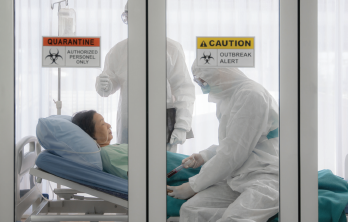
Mongkolchon Akesin / shutterstock.com
Some have opined, cynically, that transformative changes will not come to medical education and training, and to healthcare, until pigs fly. Well, in 2009–10, “swine flu,” and now we are in the midst of an unprecedented and disruptive pandemic, affecting virtually all aspects of our lives, including fellowships.1
As someone who started a rheumatology fellowship in July, permit me to share some of my thoughts.
March 15
I am in my last months of medicine residency at the beginning of the coronavirus pandemic. I am on the team caring for the first patients with COVID-19 in my hospital in Westchester County, N.Y. They are from a nearby nursing home, and we know many more will follow. I am placed in quarantine. From home, I help triage resident physicians, fellows, support staff and nurses who were all exposed to my patient. We don’t know how sick others may become.
I call my husband, who is completing ophthalmology training 300 miles away. He tells me he does not have any symptoms.
I breathe a sigh of relief, but still worry.
April 6
Respirator masks, face shields and an armor of personal protective equipment are the new normal. Medicine residents are pulled from clinics to cover intensive care units. Didactics are canceled. Patients are alone, visitors not allowed, and interactions with family members have been reduced to plasma screens.
I call my husband. It is raining in Eastern Pennsylvania. I worry.
The world is dark.
April 17
It is 3:18 a.m. My heart is broken as I stand with the cardiac resuscitation team after multiple failed attempts to bring life back to a patient suffering complications of COVID-19. He was 42 years old; his only comorbidity was obesity. His death was sudden. I tell his mother the news, and we cry together.
May–June
Many of my peers—residents and fellow
physicians—are sick. Some struggle to simultaneously care for their family members. Several attending physicians have been hospitalized for complications of COVID-19. One attending physician passed away. People are dying. I feel helpless.
June 30
I call my husband on the last day of residency. He remains well. I still worry.
I don’t know what the next phase of my professional life—rheumatology fellowship—will bring. Medicine has been a matter of life and death on a day-to-day basis. What will it be like in rheumatology? What will education, training and patient care look like during the pandemic? How will I matter and make a difference for my patients?


